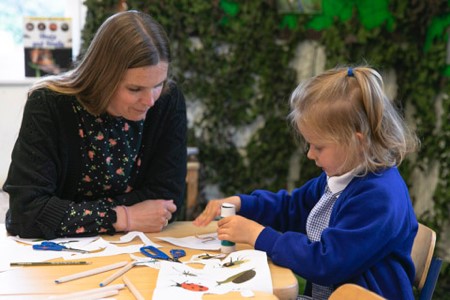English
The National Curriculum states:
English has a pre-eminent place in education and in society. A high-quality education in English will teach pupils to speak and write fluently so that they can communicate their ideas and emotions to others and through their reading and listening, others can communicate with them. Through reading in particular, pupils have a chance to develop culturally, emotionally, intellectually, socially and spiritually. Literature, especially, plays a key role in such development. Reading also enables pupils both to acquire knowledge and to build on what they already know. All the skills of language are essential to participating fully as a member of society; pupils, therefore, who do not learn to speak, read and write fluently and confidently are effectively disenfranchised.
The overarching aim for English in the national curriculum is to promote high standards of language and literacy by equipping pupils with a strong command of the spoken and written word, and to develop their love of literature through widespread reading for enjoyment.
How we meet these aims
Through our English Curriculum, we aim:
- To ensure that all pupils are receiving a well-balanced, ambitious English curriculum.
- To ensure that each teacher is providing pupils with a consistent approach to English teaching.
- To ensure that all pupils are given the opportunity to extend their knowledge and skills, and communicate through spoken and written forms.
- Through developing their knowledge, skills and understanding in English, children learn to appreciate that communication in all forms contributes to their wider understanding of the world in which they live.
- To ensure that all pupils are exposed to different purposes for writing and authors through a curriculum that is broad and balanced, relevant and engaging and is differentiated to match the needs and abilities of all children.


Phonics
We use the Read Write Inc phonics scheme to support our children in their development of reading and writing.
Children work in small groups for a session every day and practice sounds, reading and writing with an adult. We assess the children regularly and change their groups as necessary.
When children move beyond the phonics scheme we continue to develop literacy skills through guided writing and reading sessions and independent activities.
Please see Read Write Inc (RWI) guides on letter formation and phonic progression below.
Reading
Through our planning and teaching we instil a love of reading and an appreciation that through reading, the whole curriculum, and the world, become accessible. Reading is a priority, as it underpins all learning, and is taught in many different ways, which will allow all pupils to become fluent, confident readers.
As children move through the school, pupils engage with Accelerated Reader which supports their reading fluency and comprehension. They are encouraged to read a wide range of books and read at home daily too.
Oxford Owls is a great site for parents who want to support their children with reading. Registration is free and you get access to hundreds of free digital reading books.
Writing
Though our planning and teaching of writing, we provide the children with an understanding of writing; purpose and structure. We want the children to enjoy writing and use it as a means of expressing themselves.
All our writing is taught through our use of the Power of Reading approach, and linked to our topics wherever possible, giving the children a purpose and audience for their writing.
